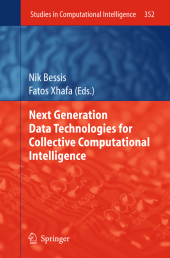 Neuerscheinungen 2013Stand: 2020-01-07 |
Schnellsuche
ISBN/Stichwort/Autor
|
Herderstraße 10
10625 Berlin
Tel.: 030 315 714 16
Fax 030 315 714 14
info@buchspektrum.de |

Nik Bessis, Fatos Xhafa
(Beteiligte)
Next Generation Data Technologies for Collective Computational Intelligence
Herausgegeben von Bessis, Nik; Xhafa, Fatos
2013. xviii, 638 S. 211 SW-Abb. 235 mm
Verlag/Jahr: SPRINGER, BERLIN 2013
ISBN: 3-642-26734-3 (3642267343)
Neue ISBN: 978-3-642-26734-5 (9783642267345)
Preis und Lieferzeit: Bitte klicken
Blending theory with practice, this book brings together a variety of next-generation data technologies used to capture, integrate, analyze, mine, annotate and visualize distributed data in a manner that is meaningful and collaborative for the organization.
This book focuses on next generation data technologies in support of collective and computational intelligence. The book brings various next generation data technologies together to capture, integrate, analyze, mine, annotate and visualize distributed data - made available from various community users - in a meaningful and collaborative for the organization manner. A unique perspective on collective computational intelligence is offered by embracing both theory and strategies fundamentals such as data clustering, graph partitioning, collaborative decision making, self-adaptive ant colony, swarm and evolutionary agents. It also covers emerging and next generation technologies in support of collective computational intelligence such as Web 2.0 social networks, semantic web for data annotation, knowledge representation and inference, data privacy and security, and enabling distributed and collaborative paradigms such as P2P, Grid and Cloud Computing due to the geographically dispersed and distributed nature of the data.
The book aims to cover in a comprehensive manner the combinatorial effort of utilizing and integrating various next generations collaborative and distributed data technologies for computational intelligence in various scenarios. The book also distinguishes itself by assessing whether utilization and integration of next generation data technologies can assist in the identification of new opportunities, which may also be strategically fit for purpose.
Part I: Foundations and Principles.- Part II: Advanced Models and Practices .- Part III: Advanced Applications Section IV: Future Trends and Concepts.


